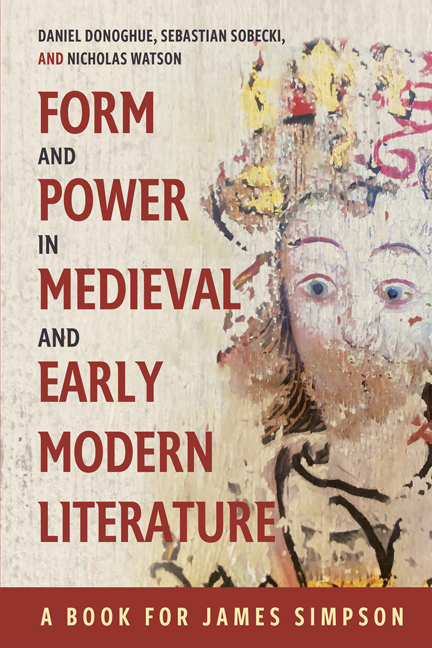Book contents
- Frontmatter
- Contents
- List of Illustrations
- Contributors and Editors
- Acknowledgments
- List of Abbreviations
- Simpson: An Interim Report
- PART I THE HERMENEUTICS OF RECOGNITION
- PART II GENRE AND FIGURE
- PART III CULTURE AND INSTITUTIONS
- PART IV REFORMATIONS
- James Simpson’s Publications from 1984 to 2024
- Bibliography
- A Note on the Bloomfield Conferences
- General Index
- Tabula Gratulatoria
9 - Petition, Justice, and Peace in Piers Plowman
Published online by Cambridge University Press: 17 May 2024
- Frontmatter
- Contents
- List of Illustrations
- Contributors and Editors
- Acknowledgments
- List of Abbreviations
- Simpson: An Interim Report
- PART I THE HERMENEUTICS OF RECOGNITION
- PART II GENRE AND FIGURE
- PART III CULTURE AND INSTITUTIONS
- PART IV REFORMATIONS
- James Simpson’s Publications from 1984 to 2024
- Bibliography
- A Note on the Bloomfield Conferences
- General Index
- Tabula Gratulatoria
Summary
This essay expands James Simpson's observation that William Langland's Piers Plowman develops its meanings out of the dynamics of different institutional discourses. By examining petitions recorded in the fourteenth-century English Parliament Rolls and William of Pagula's De Speculo Regis Edwardi III (Mirror of King Edward III, written in the 1330s), in tandem with Peace's bill in Piers Plowman, this essay argues that the emergence and development of political theory in the poem observe a particular kind of rhetorical logic with a distinctive dynamic. Langland's allegorical personification adds sophistication and sensitivity to the poem's political analysis and qualifies institutional discourses to comment on the “secular.”
For many critics, the two-way traffic between the secular and the spiritual constitutes the heart of Langland's allegory. However, in my reading of allegorical personification in the first vision of Piers Plowman, the secular Peace, deprived of the mutual containment and interpenetration of the secular and the spiritual, cannot sustain its own congruity. The suspension of mercy and grace makes justice and peace impossible.
In the first vision, the dreamer-narrator Will witnesses the King's justice in the court. One focus of the first vision in all versions of the poem is the marriage of Lady Mede, whose name has the double meaning of profit and bribery on the one hand, and gift, including the spiritual gift of God, on the other. Mede is to be wedded to the knight Conscience, whose name seems to suggest he is merely an ethical and mental abstraction but who proves to be an emphatically public figure, a diplomat, knight, and lawyer. Conscience rejects Mede and initiates a heated debate with her in the royal court, prompting the King to summon Reason.
A second, equally important focus is Peace's petition in court against the bully Wrong. Mede bribes Peace in order to appease the petitioner and acquit the abuser. Although Peace then agrees to withdraw the petition, Conscience and Reason persuade the King to execute the law strictly and punish both Mede and Wrong. In the C-text, the King then appoints Reason as Chancellor and Conscience as Chief Justice.
- Type
- Chapter
- Information
- Form and Power in Medieval and Early Modern LiteratureA Book for James Simpson, pp. 167 - 182Publisher: Boydell & BrewerPrint publication year: 2024

